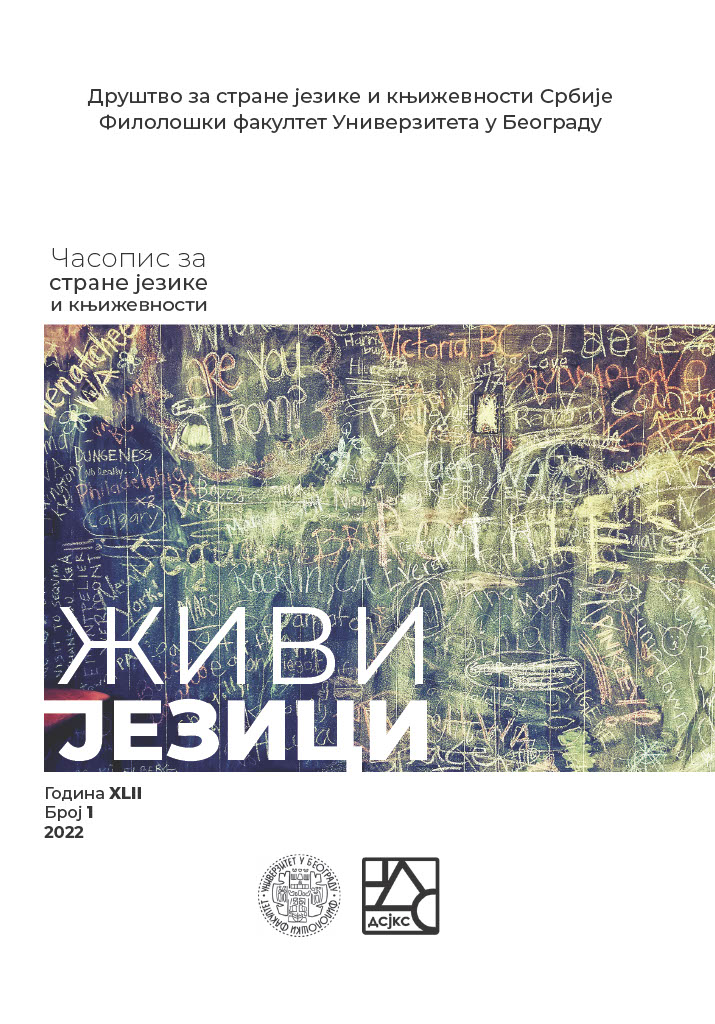The use of morphologically feminine forms when referring to the occupational and other titles of women in the online newspaper Blic from 2000 to 2018
DOI:
https://doi.org/10.18485/zivjez.2022.42.1.6Keywords:
morphologically feminine forms, linguistic gender equality, inconsistency(s), BlicAbstract
In this paper, we examine the use of the morphologically feminine forms when referring to the occupational and other titles of women in the journalistic texts of the online newspaper Blic from 2000 to 2018. The aim of this paper is to show whether the use of these forms increased during the mentioned period. For the purposes of conducting the aforementioned analysis, we gathered a corpus of 285 journalistic texts. Our hypothesis is that the use increased due to the efforts dedicated to achieving linguistic gender equality and raising awareness of its importance. However, we expect to find inconsistencies in its use because media outlets are allowed to decide independently on the application of linguistic and other aspects of media gender equality. The conducted research confirmed both stated hypotheses.
References
Begović 2016: B. Begović, Upotreba rodno osetljivog jezika i prikaz žena u štampanim medijima u Srbiji. CM: Communication Management: časopis za upravljanje komuniciranjem, 35, 59–80.
Cvetinčanin Knežević i Lalatović 2019: H. Cvetinčanin Knežević, J. Lalatović, Priručnik za upotrebu rodno osetljivog jezika. Beograd: Centar za ženske studije (Beograd: Radunić štampa)
Filipović 2009: J. Filipović, Moć reči: ogledi iz kritičke sociolingvistike. Beograd: Zadužbina Andrejević.
Filipović i Kuzmanović Jovanović 2012: J. Filipović, A. Kuzmanović Jovanović, Vodič za rodno osetljiv pristup medijima u Srbiji: Preporuke i dosadašnja praksa. Beograd: Uprava za rodnu ravnopravnost Ministarstva rada, zapošljavanja i socijalne politike Republike Srbije.
Gligorijević 2016: J. Gligorijević, Borba za jednakost je večna. Vreme, 03.11.2016, 1348. [https://www.vreme.com/vreme/borba-za-jednakost-je-vecna/]
Ignjatović 2017: Н. Б. Игњатовић, Родно осетљив језик у јавном дискурсу. Philologia Mediana, 9, 479–499. / N. B. Ignjatović, Rodno osetljiv jezik u javnom diskursu. Philologia Mediana, 9, 479–499.
Milanović, Subašić i Opačić 2017: В. Милановић, Б. Субашић, Б. Опачић, Жене у јавним установама културе. Београд: Завод за проучавање културног развитка. / V. Milanović, B. Subašić, B. Opačić, Žene u javnim ustanovama kulture. Beograd: Zavod za proučavanje kulturnog razvitka.
Milinkov 2016: S. Milinkov, Formalno i neformalno obrazovanje i profesionalni status novinarki u Vojvodini – rodna perspektiva (doktorka disertacija). [https://www.cris.uns.ac.rs/DownloadFileServlet/Disertacija145940953875246.pdf?controlNumber=(BISIS)100435&fileName=145940953875246.pdf&id=5246&source=NaRDuS&language=sr]
Savić 2004: S. Savić, Žena skrivena jezikom medija: kodeks neseksistčke upotebe jezika. Novi Sad: Futura publikacije.
Savić 2009: S. Savić, Uputstva za standardizaciju rodno osetljivog jezika. U Njegoševi dani, međunarodni naučni skup, Cetinje, 27-29. jun 2008: zbornik radova (str. 301–320). Nikšić: Filozofski fakultet.
Savić i dr. 2009: S. Savić, M. Čanak, V. Mitro, G. Štasni, Rod i jezik. Novi Sad: Futura publikacije i Ženske studije i istraživanja.
Published
How to Cite
Issue
Section
License
Copyright (c) 2022 Сања Маркељић

This work is licensed under a Creative Commons Attribution-NonCommercial-ShareAlike 4.0 International License.


